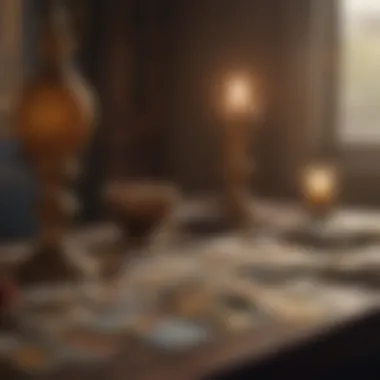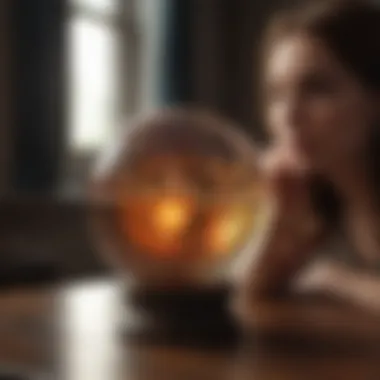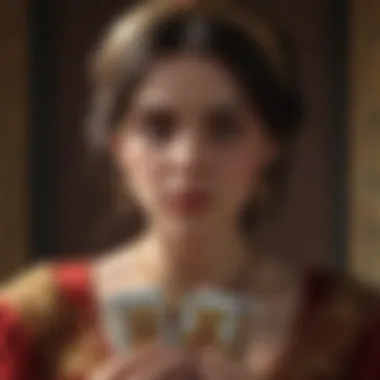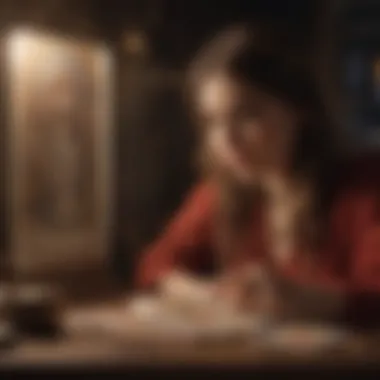Understanding Emotions Through Tarot: Does He Hate Me?


Intro
The quest to understand emotions in interpersonal relationships is a complex and often perplexing journey. Many people seek clarity, especially in moments of uncertainty and doubt. Enter tarot, a powerful tool that may provide insights into our emotional landscapes. This article aims to guide you through the nuances of tarot readings as they relate to your emotional questions, particularly the recurring thought: Does he hate me? By delving into the symbolism of the tarot cards, we seek to unlock understanding about personal relationships, helping readers navigate their feelings and relationships with greater awareness.
Understanding the Zodiac
The zodiac serves as an essential framework for interpreting human emotions and relationships. Each zodiac sign radiates unique traits and elemental qualities that influence how individuals express their feelings. Understanding these dynamics can enhance your tarot reading experience.
Overview of Zodiac Signs
There are twelve zodiac signs in astrology, each representing different aspects of personality and emotional response. These signs include:
- Aries: Assertive and often direct.
- Taurus: Stable, sometimes stubborn.
- Gemini: Curious, sometimes inconsistent.
- Cancer: Nurturing, sensitive.
- Leo: Proud, seeks recognition.
- Virgo: Analytical, detail-oriented.
- Libra: Harmonious, values relationships.
- Scorpio: Intense, complex in emotions.
- Sagittarius: Free-spirited, optimistic.
- Capricorn: Ambitious, disciplined.
- Aquarius: Innovative, values independence.
- Pisces: Intuitive, artistic, often empathic.
Sign Traits and Characteristics
Understanding the emotional characteristics associated with each sign adds depth to tarot interpretations. For instance, a Scorpio’s tendency towards intensity could indicate a deeper emotional struggle that might manifest in a tarot reading.
Elemental Qualities
Each zodiac sign belongs to one of four elements: Fire, Earth, Air, and Water. These elements further delineate emotional expression.
- Fire: Bold and passionate emotions.
- Earth: Practical and grounded feelings.
- Air: Intellectual and communicative.
- Water: Deeply emotional and intuitive.
Recognizing these elemental qualities can enhance the understanding of your tarot readings, as they highlight how emotional responses are expressed.
Understanding zodiac signs is not just about personality traits; it also provides a lens through which we can interpret emotions in the context of tarot readings.
Tarot as a Reflective Tool
Tarot is not merely a fortune-telling device. It serves as a reflective tool that can guide individuals through their emotional queries. Engaging with tarot requires a shift from asking solely what the future holds, to exploring what the cards reveal about current feelings and relationships.
Each card carries specific meanings, which can help clarify doubts. When contemplating a question like Does he hate me?, specific cards will speak volumes about emotional currents and personal dynamics.
Synthesizing Information
This exploration into tarot offers a profound way to connect with oneself, unravel complex emotions, and ultimately foster healthier relationships. As we unfold the layers of meaning in the subsequent sections, remember that each card drawn invites reflection—a chance to engage with your feelings constructively.
Prelims to Tarot and Emotions
Tarot is often seen as a mystical tool, but its true power lies in its ability to provide insights into our emotional landscapes. Understanding emotions through tarot enables individuals to delve deeper into their feelings, particularly in complex interpersonal situations. This article seeks to unpack the relationship between tarot readings and emotional inquiries, specifically addressing the question, "Does he hate me?"
By examining tarot's role in clarifying feelings, readers can gain a better grasp of their emotional state as well as the dynamics they share with others. This exploration will highlight the significance of approaching relationships with an informed perspective, allowing for enhanced emotional intelligence and personal growth.
The Role of Tarot in Understanding Feelings
Tarot acts as a reflection of one's inner world, providing symbols and narratives that resonate with personal experiences. Each card holds meanings that can shed light on various emotional states and relational dynamics. For example, when seeking answers regarding a partner's feelings, specific cards might point to underlying issues like fear, uncertainty, or even affection.
- The symbolism within the cards can create a dialogue between the seeker and their subconscious.
- This dialogue facilitates a deeper understanding of one’s fears and hopes in relationships.
- Tarot does not provide absolute answers but encourages self-exploration and acknowledgment of feelings.
In this way, tarot serves as both a guide and a mirror, helping individuals to better understand their emotions, choices, and the emotional states of those around them.


Why Questioning Feelings Matters
Addressing one's emotions, especially concerning others’ feelings, is essential for healthy interactions. What we perceive can sometimes differ vastly from reality. Through questioning feelings, individuals can clarify uncertainties and build emotional resilience.
- Exploring the question of whether someone harbors negative feelings allows an individual to confront their insecurities.
- Such inquiry can lead to improved communication, reducing assumptions that often cause misunderstandings.
- By understanding feelings, one may address issues productively instead of allowing them to fester.
In summary, questioning feelings—whether one's own or those of another—promotes self-awareness and healthy dialogue. It is through this exploration that tarot can play a pivotal role in navigating emotional complexities.
Tarot Deck Overview
A thorough understanding of the tarot deck is essential for deciphering emotional queries, particularly in the context of interpersonal relationships. Tarot readings are not just about pulling cards; they require thoughtful consideration of the deck's structure and symbolism. Each card tells a story, and together, they form a narrative that can illuminate one's emotional landscape. This is especially crucial when exploring questions like Does he hate me? The tarot deck is divided into the Major Arcana and Minor Arcana, each playing a distinct role in the guidance provided through the reading.
Major Arcana and Emotional Guidance
The Major Arcana comprises 22 cards, each symbolizing significant life events and deeper emotional themes. Cards such as The Fool, The Tower, and The Lovers provide insights into transformative experiences. These cards are often considered the backbone of a reading, as they address overarching themes affecting relationships. For example, The Lovers can signal choices that impact emotional connections, while The Tower might indicate sudden upheavals affecting feelings and perceptions. By understanding these cards, one can gain clarity on intense emotions or new perspectives regarding someone's feelings.
Minor Arcana: Nuances of Everyday Feelings
The Minor Arcana, consisting of 56 cards, delves into the subtleties of daily emotions and experiences. This section is divided into four suits: Wands, Cups, Swords, and Pentacles, each governing different aspects of life. Cups, in particular, relate closely to emotions and relationships. The Two of Cups, for instance, represents partnerships and mutual feelings but can also signify the need for balance. Understanding these nuanced emotions is vital when interpreting tarot readings about interpersonal dynamics. It allows the seeker to appreciate the layers of feelings at play and assess the context behind the question, such as if he truly harbors negative feelings.
A well-rounded approach to tarot readings encompasses the understanding of both Major and Minor Arcana. Recognizing how these cards interact with your queries can lead to more insightful interpretations.
Common Feelings Addressed in Tarot Readings
In the realm of tarot, emotions play a fundamental role in understanding the connections between individuals. Various feelings emerge during readings that address the complexities of relationships. Those feelings often reflect confusion, fear, love, and rejection. Each of these emotional states can deeply influence personal dynamics, making it essential to explore them thoroughly.
The significance of addressing common feelings in tarot readings lies in the clarity it can provide. When someone is uncertain about another's feelings, for example, tarot can serve as a reflective tool. It helps users navigate the murky waters of human emotions and exposes the underlying truths that may be obscured by doubt. Furthermore, acknowledging these feelings can aid in response to personal queries and shape the path for moving forward.
Confusion and Ambivalence
Confusion is a prevalent emotion many individuals experience when assessing relationships. This feeling often surfaces when mixed signals are present. In tarot, certain cards can symbolically speak to this confusion. Cards such as the Two of Swords illustrate indecision and the difficulty of making choices. Tarots can clarify the conflicts within oneself.
Ambivalence can appear simultaneously with confusion, creating a sense of being torn between options. The conflicting emotions can lead to more profound misunderstandings and strained interactions. Tarot readings can help delineate the nature of these feelings. Understanding the dynamic at play can prompt more productive conversations or highlight the areas that need attention.
Fear and Anxiety in Relationships
Fear and anxiety are common emotions felt in relationships. These feelings often stem from the fear of rejection, failure, or emotional vulnerability. Fear may hinder one’s ability to express genuine feelings, leading to misunderstandings.
In a tarot reading, cards like the Nine of Swords depict anxiety, while the Ten of Wands often shows the burden that comes with these feelings. Reading these cards can be insightful. They might indicate that fear is influencing perceptions of another's feelings. Acknowledging this emotion can begin to shift it towards productive action, helping individuals to confront their worries instead of avoiding them.
Love and Rejection
The feelings of love and potential rejection are deeply intertwined in a person's emotional landscape. The longing for connection often battles the fear of being rejected. This duality can create a complex emotional environment that leads individuals to question their worth or the intentions of others.
Tarot cards such as The Lovers or the Three of Swords can offer important insights. The Lovers may indicate a strong bond and mutual attraction, whereas the Three of Swords usually symbolizes heartbreak and disappointment. By understanding the nuances of these feelings, tarot readings can guide individuals in their pursuit of emotional fulfillment or healing.
In summary, exploring these common feelings within tarot readings is vital. By delving into confusion, fear, and love, individuals gain clarity in their emotional states and relationships. Tarot can serve as a pathway toward self-discovery and understanding, essential for interpreting the often chaotic realm of emotions.
Interpreting Tarot for Relationship Questions
Interpreting tarot readings in the context of relationship questions is essential for gaining emotional clarity and understanding interpersonal dynamics. Tarot serves as a powerful tool that allows individuals to explore feelings hidden beneath the surface. When one asks about relationship sentiments, such as "Does he hate me?", it opens the door to profound insights that can illuminate areas of uncertainty.
There are several benefits to interpreting tarot for relationship queries. First, it offers the user a visual representation of their emotional landscape. Each card represents unique energies and influences that can shed light on complex feelings. This can lead to greater self-awareness, helping individuals confront uncomfortable emotions rather than avoid them.


Furthermore, the reading can highlight both external factors and internal beliefs that may be affecting the relationship in question. It also allows for the exploration of patterns that have emerged, offering the chance to reflect on past experiences that shape current dynamics. Ultimately, working with tarot in this context fosters a dialogue, not only with the cards but with oneself, encouraging deeper emotional introspection.
Common Landscapes of Relationships
When navigating the intricate realms of relationships through tarot, it is important to recognize common landscapes that emerge. These landscapes often characterize the emotional dynamics between individuals. Here are some common themes:
- Attachment Styles: Understanding whether individuals are secure, anxious, or avoidant in their attachments can help decipher relationship conflicts.
- Communication Patterns: Effective communication can either strengthen or weaken a relationship. Tarot can reveal underlying issues in communication styles.
- Power Dynamics: Relationships often entail various power dynamics that can lead to feelings of resentment or imbalance. The cards can provide insight into these patterns.
Recognizing these landscapes helps individuals frame their questions and interpret the tarot reading more effectively. Engaging with the cards allows for a new perspective on familiar emotional experiences.
Cues from the Cards: What to Look For
Interpreting the tarot provides valuable cues that help the querent understand the question regarding feelings, such as "Does he hate me?" Key elements to consider include:
- Card Suit Significance: Major Arcana cards can denote significant life events or spiritual lessons, while Minor Arcana cards usually address daily experiences and emotions.
- Card Positioning: The placement of cards in the spread can convey information about past, present, and future emotional states.
- Repetition of Themes: Pay attention to recurring cards across different readings. Persisting themes can indicate strong emotions or unresolved feelings.
- Intuitive Resonance: Acknowledge personal interpretations. Each reader may find unique meanings in the symbols or imagery present in the cards.
By identifying these cues, individuals can extract meaningful insights regarding their concerns about relationships. Tarot becomes less about predictions and more a tool for personal exploration and understanding.
Does He Hate Me? Analyzing the Question
The exploration of whether someone harbors negative feelings, such as hatred, can be intricate and emotionally charged. Addressing the question
Conducting a Tarot Reading for Emotional Clarity
Conducting a tarot reading for emotional clarity is pivotal in answering relationship questions, especially those concerning feelings like 'Does he hate me?'. This approach allows individuals to use the tarot as a mirror, reflecting their internal emotional landscape. Tarot is more than just a set of cards; it serves as a facilitative tool that can help unpack complex feelings. It pushes one to confront emotions rather than avoid them, forging a direct connection between intuition and understanding.
In tarot, the cards symbolize various emotional states and dynamics. Each card drawn represents different nuances in interpersonal interactions, helping to gain insight into otherwise unclear situations. This facet proves significant, not only in addressing immediate concerns but also in promoting long-term emotional growth. While conducting a reading, it's vital to focus on intents and open-mindedness. A clear emotional query sets the stage for receiving guidance from the cards.
Choosing the Right Spread
Selecting an appropriate tarot spread is foundational for a successful reading. Each spread serves a purpose and offers a different angle of interpretation, which can be vital for emotional clarity. For someone asking 'Does he hate me?', a three-card spread can be particularly helpful. Here are some common choices:
- Celtic Cross: Offers extensive context, covering past influences and future possibilities.
- Three-Card Spread: Simple and direct, focusing on past, present, and future regarding the individual emotions.
- Relationship Spread: Tailored specifically for insights about relationships and emotional ties between individuals.
Picking the right spread aligns your question with the insights you seek and opens pathways to deciphering emotions not immediately apparent. It is essential to take the time and consider which layout resonates with your situation. A well-chosen spread can clarify uncertainties surrounding emotional connections.
Card Placement and Its Significance
The placement of each card within a spread carries specific significance. Each position tells a part of the story and provides layers of meaning that affect overall interpretation. Understanding these placements can enhance the reading process:
- Past influences: Reflects on earlier events shaping emotional dynamics.
- Present circumstances: Offers insight into current feelings and attitudes.
- Future possibilities: Suggests potential outcomes based on current emotional configurations.
Emotional Insights from Specific Cards
Understanding emotions related to interpersonal dynamics can be complex. Tarot cards can illuminate feelings and provide clarity when assessing whether someone harbors negative sentiments, like hate. Each card carries significant symbolism and meaning. These insights can lead to personal discoveries. By recognizing the emotional undercurrents present in specific cards, one can achieve a more nuanced understanding of their situation. This may help alleviate confusion and promote emotional clarity.
The Tower: Turmoil and Realizations
The Tower card often signifies upheaval and unexpected shifts. When drawn in the context of questioning someone’s feelings, it might indicate that current perceptions are misleading or unstable. This card encourages a confrontation with harsh truths, challenging individuals to reassess their emotional reality.
Those who pull this card should reflect on their past experiences. Are there unresolved issues? Recognizing the chaos within and around themselves can lead to meaningful realizations. The Tower serves as a reminder that growth often follows turmoil. Through this lens, it prompts a deeper understanding of not just how others feel, but also how one feels about oneself.
The Lovers: Choices and Harmony
The Lovers card embodies duality and choices, often related to significant relationships. Its presence in a tarot reading can indicate a time for introspection about mutual feelings. This card suggests that the question, 'Does he hate me?', may stem from misunderstandings or choices made in the relationship.


In this context, the Lovers urges individuals to contemplate their decisions. Are they open and communicative, or have they shied away from difficult conversations? It also highlights the importance of balancing emotions within oneself and with others. By recognizing the potential for harmony, one can navigate feelings of tension or dissatisfaction more effectively.
Five of Cups: Grief and Acceptance
The Five of Cups depicts sorrow and loss but also emphasizes the importance of acceptance and resilience. This card may appear when one feels rejected or unloved. It urges an understanding of what is lost while recognizing that not everything is negative. When pondering feelings of hate, this card encourages a healthier perspective.
It serves as a reminder to acknowledge grief while also being aware of the potential for healing. The Five of Cups illustrates that even in sadness, there is a possibility for emotional growth. Acceptance of one’s feelings can lead to a transformative process, paving the way for healthier dynamics. In recognizing this journey, one may find the clarity needed to navigate personal circumstances.
Beyond the Cards: Coping with Difficult Emotions
Understanding the emotional complexities within interpersonal relationships is a vital aspect of tarot readings. Tarot serves as a mirror, reflecting not only external dynamics but also internal struggles. After delving into the cards, the need to process emotions becomes apparent. This section emphasizes the importance of coping strategies that extend beyond the tarot's interpretations.
Coping with difficult emotions requires honest self-reflection. The insights gained from a tarot reading can evoke a range of feelings—confusion, sadness, or even anger. Addressing these responses fosters emotional accountability. Recognizing one's feelings is the first step toward personal growth and healing.
Additionally, effective communication plays a crucial role in navigating these emotions. Sharing and discussing feelings with others can lighten the burden of emotional struggles. This exchange encourages understanding and connection, helping to sort through feelings that may arise after a tarot session.
Self-Reflection and Emotional Accountability
Self-reflection is a core component in processing difficult emotions. After conducting a tarot reading, it is essential to take time to ponder your feelings. Ask yourself questions such as:
- What emotions did the reading bring up?
- How do these emotions connect to my current life situations?
- Am I avoiding certain feelings that need acknowledgment?
By answering these questions, you can start to unravel your emotional state. It enables you to see patterns in your relationships and helps you understand how others impact your feelings. Emotional accountability means taking ownership of your feelings without placing blame on others. This personal responsibility is crucial in cultivating healthier relationships.
Communicating Feelings Effectively
Once self-reflection is achieved, the next step is effective communication. It’s important to express emotions clearly and honestly. Engaging in dialogues about feelings can lead to deeper understanding with others. Consider these strategies:
- **Use
The Subjective Nature of Tarot Readings
Understanding the subjective nature of tarot readings is essential in interpreting the complex emotional landscapes that often accompany relationship inquiries. Tarot does not function as a definitive answer machine but rather as a reflective tool that can illuminate one’s internal emotions and perceptions. Each card holds significance personal to the querent, shaped by their experiences, beliefs, and intent. This individuality is what makes tarot a profound exploration of self and feelings.
In the context of questioning whether someone harbors negative emotions, like hatred, the interpretations of the cards can vary dramatically between different readers and querents. This subjectivity implies that the same card may offer disparate insights depending on who is interpreting it. Consequently, while tarot can clarify emotional situations, the onus is on the individual to consider what resonates with their personal truth.
Trusting Your Instincts
Instinct plays a crucial role in tarot reading. Trusting one’s intuition can enhance the efficacy of a tarot session. Readers often tap into their inner guidance, allowing it to shape their interpretation of the cards. This makes tarot a unique practice where personal insights are paramount. When faced with the question,
Finale: Tarot as a Tool for Self-Discovery
Tarot serves as a unique tool for self-discovery, affording individuals the opportunity to explore their emotions and interpersonal dynamics. Throughout this article, we have discussed the various facets of tarot, particularly in context of understanding complex feelings. Tarot invites introspection and allows users to gaze into their own emotional landscapes.
Embracing Uncertainty in Emotional Contexts
In the realm of relationships, uncertainty is an inevitable companion. Tarot offers a lens through which this uncertainty can be examined. The cards can illustrate possibilities rather than certainties. They encourage individuals to reflect on their own feelings and the underlying reasons behind these emotions. By interpreting the cards, one can begin to confront that uncertainty instead of evading it.
Interactive question like "Does he hate me?" can lead to broader considerations about trust, anxiety, and expectations. Through the process of tarot reading, individuals learn to embrace their uncertainties rather than let fear dictate their emotional responses. Thus, tarot can provide clarity, but it does not necessarily provide absolutes.
Encouraging Personal Growth through Reflection
Each tarot reading acts as a catalyst for personal growth. It compels individuals to engage in honest self-reflection. When faced with the impressions from the cards, one starts to dissect their understanding of relationships. The emotional responses elicited by specific cards guide one toward a deeper comprehension of their feelings and motivations.
This journey of discovery may not always be comfortable, yet it is essential. The process of articulating feelings and recognizing patterns habitually leads to enhanced self-awareness and emotional intelligence. Whether the outcome of a reading reassures or challenges, the insights gained contribute greatly to personal growth. Therefore, utilizing tarot as a reflective practice can foster resilience and emotional clarity over time.
Tarot is not just a means to answer questions; it serves as a mirror, reflecting our own fears, hopes, and realities.
Ultimately, tarot reading is a journey into the self. It helps individuals navigate emotional turbulence and enables them to make informed choices in their relationships. By embracing the revelations provided by the cards, one can cultivate a deeper understanding of both their feelings and how they wish to engage with others.







